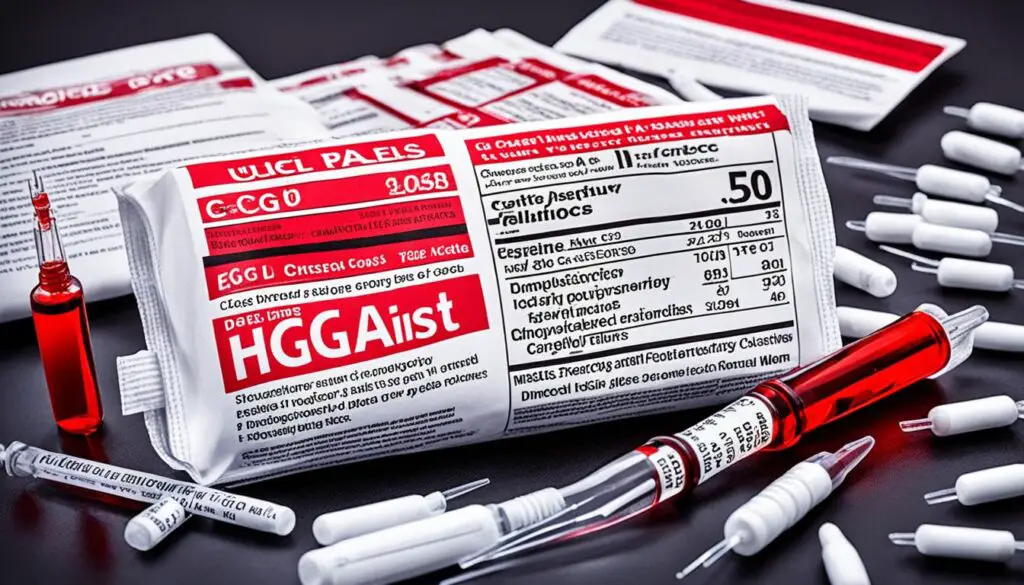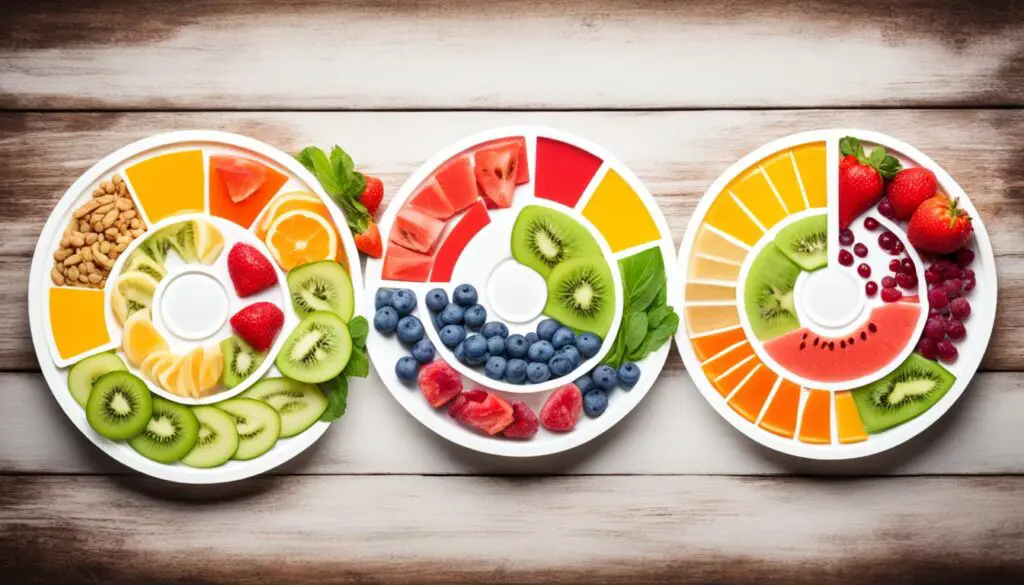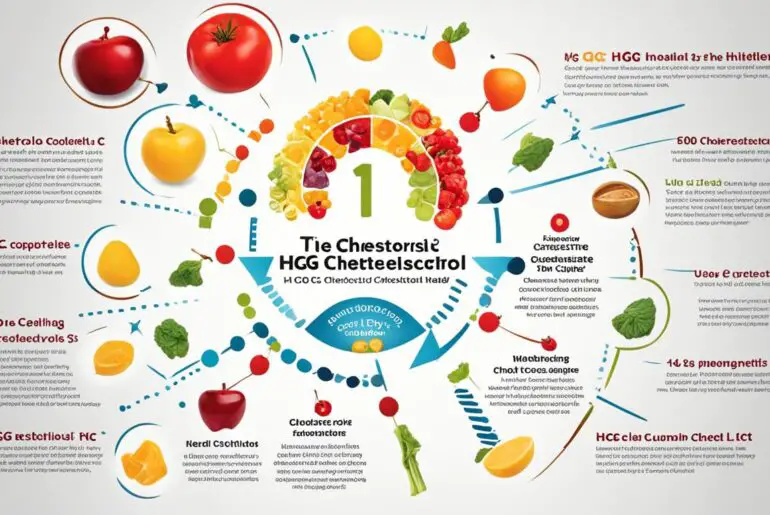Are you tired of struggling with weight loss? Looking for a diet plan that guarantees quick results without starvation? The HCG diet might have caught your attention. But how does this controversial diet protocol really work? And is it as effective and safe as it claims to be?
The HCG diet promises rapid weight loss of 1-2 pounds per day by combining an ultra-low-calorie diet with HCG hormone injections. The idea is that the hormone boosts metabolism and promotes fat burning, while the calorie restriction forces the body to use stored fat for energy. Sounds impressive, right?
However, the reality is not so straightforward. The FDA deems the HCG diet illegal and dangerous, calling it a scam. And studies have shown that weight loss on the HCG diet is primarily due to drastic calorie restriction, not the hormone itself.
In this article, I will dive into the intricacies of the HCG diet and unravel the truth behind its claimed effectiveness. We will explore the four phases of the HCG diet, examine the science behind weight loss, discuss the effects on body composition, and shed light on the safety concerns surrounding HCG diet products.
Key Takeaways:
- The HCG diet promises rapid weight loss through combining an ultra-low-calorie diet with HCG hormone injections.
- The FDA considers the HCG diet illegal and dangerous.
- Weight loss on the HCG diet is primarily due to calorie restriction, not the HCG hormone.
- The HCG diet can lead to decreased muscle mass, metabolic slowdown, and increased hunger hormones.
- There are safer and more effective methods for weight loss, consult with a healthcare professional for personalized advice.
What is HCG?
HCG, or human chorionic gonadotropin, is a hormone that is naturally produced in high levels during early pregnancy. It is often used as a marker in home pregnancy tests to confirm pregnancy. Additionally, HCG has been used in medical treatments for infertility.
In 1954, the hormone hCG was first proposed as a potential weight loss tool. Since then, it has been incorporated into the HCG diet, a weight loss protocol that combines calorie restriction with HCG hormone supplementation.
The theory behind the use of HCG in the diet is that it stimulates fat burning and boosts metabolism, leading to increased weight loss. However, it is important to note that the effectiveness of HCG itself in promoting weight loss is still a topic of debate and research.
“HCG, or human chorionic gonadotropin, is a hormone that is used as a marker in home pregnancy tests and has been used in medical treatments for fertility. It was first proposed as a weight loss tool in 1954 and is now incorporated into the HCG diet.”
The Science Behind Weight Loss
Proponents of the HCG diet claim that the HCG hormone promotes weight loss and fat burning while reducing hunger. However, studies have shown that weight loss achieved on the HCG diet is primarily due to drastic calorie restriction and not the hormone itself. Multiple studies have compared the effects of HCG and placebo injections in individuals on a calorie-restricted diet and found no significant difference in weight loss between the two groups. Additionally, the HCG hormone has been shown to be ineffective in reducing hunger.
Effects on Body Composition

One common side effect of weight loss is decreased muscle mass, which can be particularly common in diets that severely restrict calorie intake like the HCG diet. Proponents claim that the HCG diet only causes fat loss and not muscle loss, but there is no scientific evidence to support this claim. Calorie restriction can also lead to a metabolic slowdown and increased hunger hormones, making it difficult to maintain weight loss in the long term.
When embarking on the HCG diet, it’s important to understand the potential impact on your body composition. While the diet may promise rapid weight loss, it’s important to consider the potential consequences for long-term health and sustainability. Severe calorie restriction can lead to muscle loss, as the body breaks down muscle tissue for energy when faced with a shortage of calories.
Contrary to the claims of proponents, there is no scientific evidence to suggest that the HCG diet specifically targets fat stores while preserving muscle mass. In fact, numerous studies have shown that rapid weight loss diets, such as the HCG diet, can result in significant muscle loss along with fat loss.
This muscle loss can have negative effects on your overall body composition. Muscle plays a crucial role in maintaining a healthy metabolism, as it burns more calories at rest compared to fat. Therefore, a decrease in muscle mass can lead to a slower metabolism, making it even more challenging to maintain weight loss in the long term.
In addition to muscle loss, calorie restriction can also trigger a metabolic slowdown. When the body senses a prolonged decrease in calorie intake, it adapts by reducing its metabolic rate. This metabolic slowdown makes it more difficult to continue losing weight and can lead to weight regain once normal calorie intake is resumed.
Furthermore, severe calorie restriction can increase hunger hormones such as ghrelin, making it challenging to adhere to the HCG diet in the long term. The constant feeling of hunger can lead to cravings and overeating, sabotaging the weight loss efforts.
It’s important to approach any weight loss program, including the HCG diet, with caution and consideration for its potential effects on body composition and long-term weight management. Consulting with a healthcare professional is recommended to ensure a safe and sustainable approach to weight loss that takes into account individual needs and goals.
The Phases of the HCG Diet
The HCG diet is divided into four essential phases that are designed to facilitate weight loss and promote long-term weight management. Each phase serves a specific purpose in the overall diet plan, contributing to the desired results. Let’s take a closer look at each phase:
1. Loading Phase
The first phase of the HCG diet is the loading phase. During this phase, individuals take HCG injections and consume a high-fat, high-calorie diet for two days. This phase aims to prepare the body for weight loss by increasing energy stores and priming the metabolism.
2. Weight Loss Phase
The second phase is the weight loss phase, which typically lasts for 3-6 weeks. In this phase, individuals continue to take HCG injections while significantly limiting their calorie intake to around 500 calories per day. The HCG hormone helps curb hunger and encourages the body to utilize stored fat as a source of energy, leading to substantial weight loss.
3. Maintenance Phase
After the weight loss phase, the maintenance phase begins. This phase spans three weeks and focuses on gradually increasing calorie intake while avoiding sugar and starch. It allows individuals to stabilize their weight loss and adopt healthier eating habits in a sustainable manner.
4. Stabilization Phase
The final phase is the stabilization phase. It involves maintaining the weight loss achieved during the previous phases and adapting to a healthier lifestyle. This phase emphasizes the importance of implementing long-term strategies to sustain weight loss and prevent future weight gain.
By following each phase of the HCG diet plan, individuals can experience significant weight loss while establishing healthy habits that can contribute to long-term success.
Stay tuned for the next section, where we will explore the scam products and safety concerns associated with the HCG diet.
Scam Products and Safety Concerns

When it comes to HCG diet products, it’s important to be cautious and aware of potential scams. Many products on the market claim to contain HCG, but in reality, they are labeled as homeopathic and do not actually contain any real HCG hormone.
It’s crucial to note that the only way to raise blood levels of HCG is through injections administered by a healthcare professional. These injections are carefully regulated and monitored to ensure safety and effectiveness.
The FDA has not approved HCG as a weight loss aid, and there are valid safety concerns surrounding HCG products. These products are unregulated and often contain unknown ingredients, which can pose serious risks to your health and well-being.
Side effects of the HCG diet can vary and may include common symptoms such as headaches, depression, and fatigue. However, more severe health issues, such as blood clots, have also been reported.
It is vital to prioritize your health and consult with a healthcare professional before embarking on any weight loss journey. They can provide guidance and recommend safe and effective alternatives to the HCG diet.
| Scam Products and Safety Concerns | |
|---|---|
| Key Points | |
| Many HCG diet products are labeled as homeopathic and do not contain real HCG hormone | |
| The only way to raise blood levels of HCG is through injections administered by a healthcare professional | |
| The FDA has not approved HCG as a weight loss aid and has raised concerns about the safety of HCG products | |
| HCG products are unregulated and may contain unknown ingredients | |
| Side effects of the HCG diet can include headaches, depression, fatigue, and more serious health issues |
The Bottom Line
The HCG diet is widely known as an extreme weight loss protocol that restricts daily calorie intake to around 500 calories. While this level of calorie restriction can lead to significant weight loss, it’s important to understand that the HCG hormone itself doesn’t directly contribute to this weight loss or reduce hunger. Studies have shown that the primary driver of weight loss on the HCG diet is the severe calorie restriction, rather than the hormone.
While some individuals may experience success with the HCG diet, it’s crucial to consider that there are many other effective and safer methods available for weight loss and weight management. Consulting with a healthcare professional is highly recommended to determine the best approach for individual needs and goals.
“Extreme weight loss measures, such as the HCG diet, should be approached with caution and under the guidance of a healthcare professional. It’s essential to prioritize long-term health and sustainable weight management.”
There are various effective weight loss methods that focus on a balanced diet, regular exercise, and lifestyle changes. These methods prioritize sustainable weight loss, overall well-being, and long-term success. By making gradual and healthy changes to your lifestyle, you can achieve and maintain your desired weight without resorting to extreme measures like the HCG diet.
Remember, effective weight loss is a journey that requires dedication, consistency, and professional guidance. Prioritize your health and consult with a healthcare professional before embarking on any extreme weight loss regimen.
Benefits of Effective Weight Loss Methods
- Long-term weight management
- Improved overall health and well-being
- Reduced risk of chronic diseases
- Increase in energy levels
- Enhanced self-confidence and body image
Risks of Extreme Weight Loss Methods
- Potential loss of muscle mass
- Metabolic slowdown
- Inadequate nutrient intake
- Potential for nutrient deficiencies
- Difficulty in maintaining weight loss long-term
Consider a Sustainable Approach
When it comes to weight loss, it’s important to prioritize your health and well-being. Choose effective weight loss methods that promote a balanced approach, incorporating healthy eating habits, regular physical activity, and sustainable lifestyle changes. Remember, achieving and maintaining a healthy weight is a long-term commitment that should be undertaken with the guidance of healthcare professionals.
How the HCG Diet Works
The HCG diet is a short-term eating plan designed to promote weight loss. It combines drastic calorie reduction with the HCG hormone, resulting in a unique approach that aims to accelerate fat burning and support rapid weight loss. The theory behind the diet is that the HCG hormone helps to stimulate the body’s metabolism and target stubborn fat stores, while the calorie reduction forces the body to tap into its fat reserves for energy.
The HCG diet consists of three main phases: the loading phase, the weight loss phase, and the maintenance phase. During the loading phase, individuals are instructed to consume high-calorie and high-fat foods for a brief period to prepare the body for the subsequent calorie reduction. This phase typically lasts for two days and allows the body to store additional fat for energy during the weight loss phase.
Following the loading phase, individuals enter the weight loss phase, during which they adhere to a strict calorie-restricted diet of around 500 calories per day. This phase lasts for 3 to 6 weeks and involves the administration of HCG hormone, which can be in the form of injections, drops, or pellets. The combination of calorie reduction and HCG hormone is believed to enhance fat burning and minimize muscle loss.
Finally, the maintenance phase focuses on stabilizing the weight loss achieved during the previous phases and transitioning to a more sustainable eating plan. Calorie intake gradually increases, and individuals are advised to avoid sugar and starch during this phase. The maintenance phase typically lasts three weeks.
The HCG diet is designed as a short-term approach to weight loss and is not intended for long-term use. It is important to consult with a healthcare professional before starting the diet to ensure it is suitable for individual needs and to address any potential risks or concerns.
| Phase | Description |
|---|---|
| Loading Phase | High-calorie and high-fat diet to prepare the body for weight loss |
| Weight Loss Phase | Drastic calorie reduction (around 500 calories per day) with HCG hormone administration |
| Maintenance Phase | Gradual increase in calorie intake while avoiding sugar and starch |
The Three Phases of the HCG Diet

The HCG diet follows a structured approach with three main phases: the loading phase, the weight loss phase, and the maintenance phase. Each phase plays a crucial role in achieving successful weight loss and transitioning to a healthier lifestyle.
The Loading Phase
The loading phase is the initial stage of the HCG diet, lasting for two days. During this phase, individuals consume high-calorie and high-fat foods to prepare the body for the next phase. The goal is to build up fat stores and kickstart the weight loss process. While it may seem counterintuitive, this phase is essential for maximizing the effectiveness of the HCG hormone and ensuring optimal results in the subsequent phases.
The Weight Loss Phase
The weight loss phase is the heart of the HCG diet, lasting for 3-6 weeks. It involves a drastic reduction in calorie intake, typically around 500-800 calories per day. Alongside the calorie restriction, individuals receive HCG hormone administration. The combination of calorie reduction and HCG hormone is believed to facilitate weight loss by promoting fat burning and suppressing hunger. This phase requires discipline and commitment, as it involves following a strict diet plan and adhering to the recommended calorie intake.
The Maintenance Phase
Once the weight loss phase is completed, individuals enter the maintenance phase. During this phase, calorie intake gradually increases over three weeks, while still avoiding sugar and starch. The purpose of the maintenance phase is to stabilize the weight loss and transition to a more sustainable and balanced eating pattern. It allows the body to adjust to the new weight and establish a healthier metabolism. This phase is crucial for long-term success and maintaining the achieved weight loss.
The three phases of the HCG diet work together to create a structured path towards weight loss and healthier living. By following each phase diligently, individuals can optimize their weight loss journey and increase the likelihood of sustainable results.
| Phase | Description |
|---|---|
| Loading Phase | Consuming high-calorie and high-fat foods to prepare the body for weight loss |
| Weight Loss Phase | Drastic calorie reduction (500-800 calories per day) with HCG hormone administration |
| Maintenance Phase | Gradually increasing calorie intake while avoiding sugar and starch |
Conclusion
The HCG diet offers a structured approach to weight loss, consisting of four distinct phases. These phases aim to promote weight loss and encourage a healthier lifestyle. However, it’s important to note that while the HCG hormone is believed to play a role in weight loss, studies have shown that the primary factor for weight loss on the HCG diet is calorie restriction.
To achieve weight loss in a safe and sustainable manner, it is crucial to consider other effective methods and consult with a healthcare professional. There are numerous approaches available that can cater to individual needs and goals, ensuring a personalized weight loss journey.
Embarking on a weight loss journey requires careful consideration of one’s health and well-being. It’s essential to prioritize safety and approach weight loss with a long-term perspective. Consulting with a healthcare professional can provide valuable guidance and help determine the best approach for achieving desired weight loss goals.
FAQ
What are the phases of the HCG diet?
The HCG diet consists of four phases: the loading phase, the weight loss phase, the maintenance phase, and the stabilization phase.
What is HCG?
HCG, or human chorionic gonadotropin, is a hormone that is present in high levels during early pregnancy. It is used as a marker in home pregnancy tests and has been used to treat fertility issues.
Does HCG promote weight loss?
While proponents of the HCG diet claim that the hormone promotes weight loss, studies have shown that weight loss on the HCG diet is primarily due to calorie restriction and not the hormone itself.
Does the HCG diet cause muscle loss?
Calorie restriction, such as that found in the HCG diet, can lead to decreased muscle mass. There is no scientific evidence to support the claim that the HCG diet causes fat loss while preserving muscle mass.
What are the four phases of the HCG diet?
The four phases of the HCG diet are the loading phase, the weight loss phase, the maintenance phase, and the stabilization phase.
Are HCG products safe?
Many HCG products on the market are labeled as homeopathic and do not contain any real HCG hormone. The FDA has raised safety concerns about these unregulated products.
Is the HCG diet an effective weight loss method?
While the HCG diet may lead to weight loss, it is an extreme approach that restricts calorie intake to a very low level. There are many other effective and safer methods for weight loss and weight management.
How does the HCG diet work?
The HCG diet combines drastic calorie reduction with the HCG hormone to promote weight loss. The theory is that the hormone helps the body burn fat, while the calorie reduction forces the body to use stored fat for energy.
What are the three phases of the HCG diet?
The three phases of the HCG diet are the loading phase, the weight loss phase, and the maintenance phase.
Is the HCG diet recommended for long-term weight loss?
The HCG diet is a short-term eating plan that lasts between three and six weeks. It is not recommended for long-term weight loss, and it is important to consult with a healthcare professional for personalized guidance.




